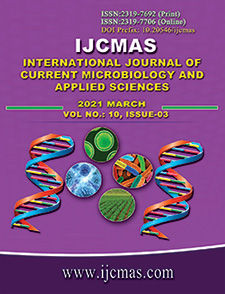


 National Academy of Agricultural Sciences (NAAS)
National Academy of Agricultural Sciences (NAAS)

|
PRINT ISSN : 2319-7692
Online ISSN : 2319-7706 Issues : 12 per year Publisher : Excellent Publishers Email : editorijcmas@gmail.com / submit@ijcmas.com Editor-in-chief: Dr.M.Prakash Index Copernicus ICV 2018: 95.39 NAAS RATING 2020: 5.38 |
A field experiment was conducted during kharif season at Crop Physiology Field Area, CCS Haryana Agricultural University, Hisar, India with the objectives to assess the mitigating effect of different rhizobial strains on physiological and biochemical traits in mungbean and to measure the association of these traits with crop performance under drought condition. Crop was raised under optimum conditions (irrigated) or drought stress without any post sowing irrigation (rainfed conditions).The experimental treatments consisting of (a) without inoculation (only RDF) and (b) with inoculation (RDF with combination of five rhizobial strains viz. Vigna 703 + PSB strain P-36, MR 63, MR 54, MB 17a and MH 8b2). The measurement of chlorophyll fluorescence (Fv/Fm), membrane stability index (MSI%), chlorophyll content, canopy temperature depression (CTD) were done at 50% flowering, which were found to be decreased by 16.3%,17.7 %, 2.9% and 88%, respectively under drought stress. The plants inoculated with rhizobial isolate MR63 and MB 17a showed greater Fv/Fm(18.7% and 15.9%), MSI% (19.4% and 17.9%), chlorophyll content (20.2% and 16.2%) and CTD (151.3% and 104.8%) respectively over RDF. Significant positive correlation was observed among seed yield and MSI (%); seed yield and chlorophyll fluorescence. CTD has a significant negative correlation with chlorophyll content and seed yield.
 |
 |
 |
 |
 |